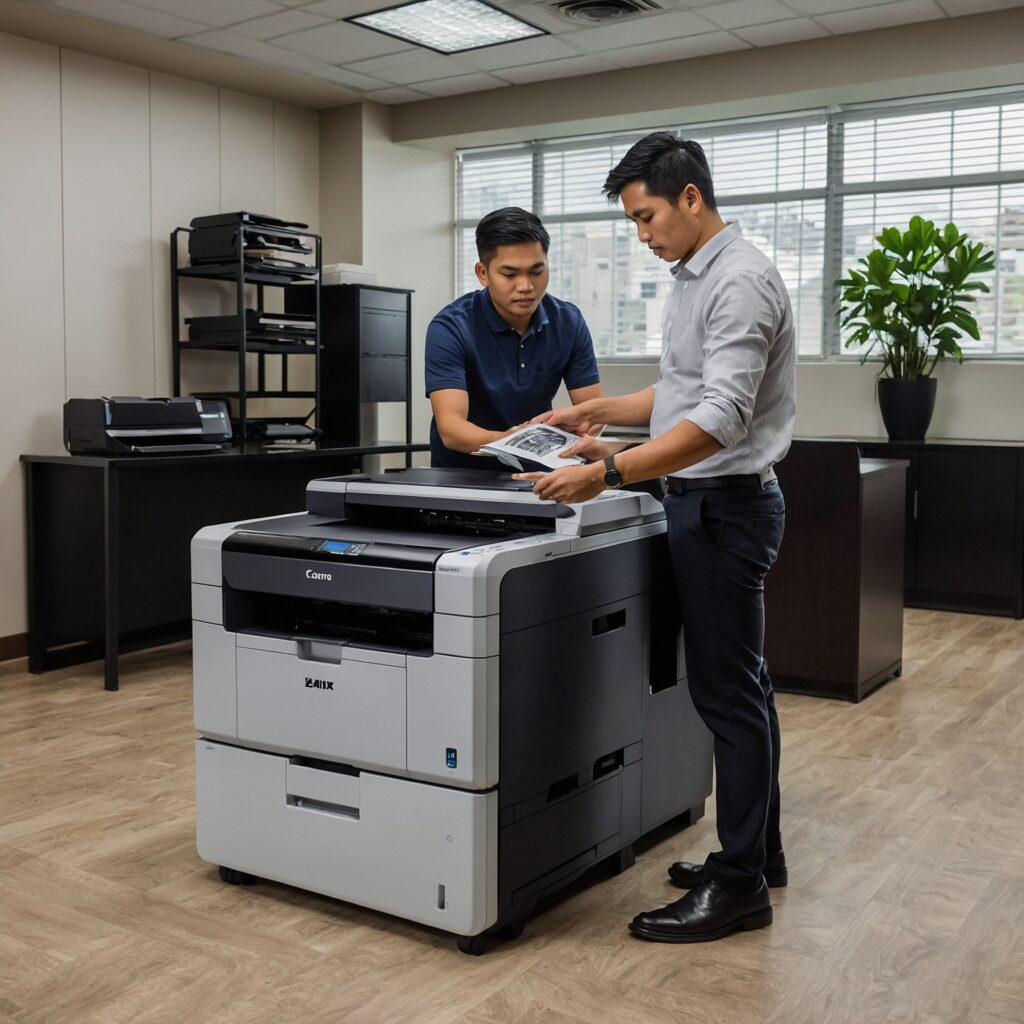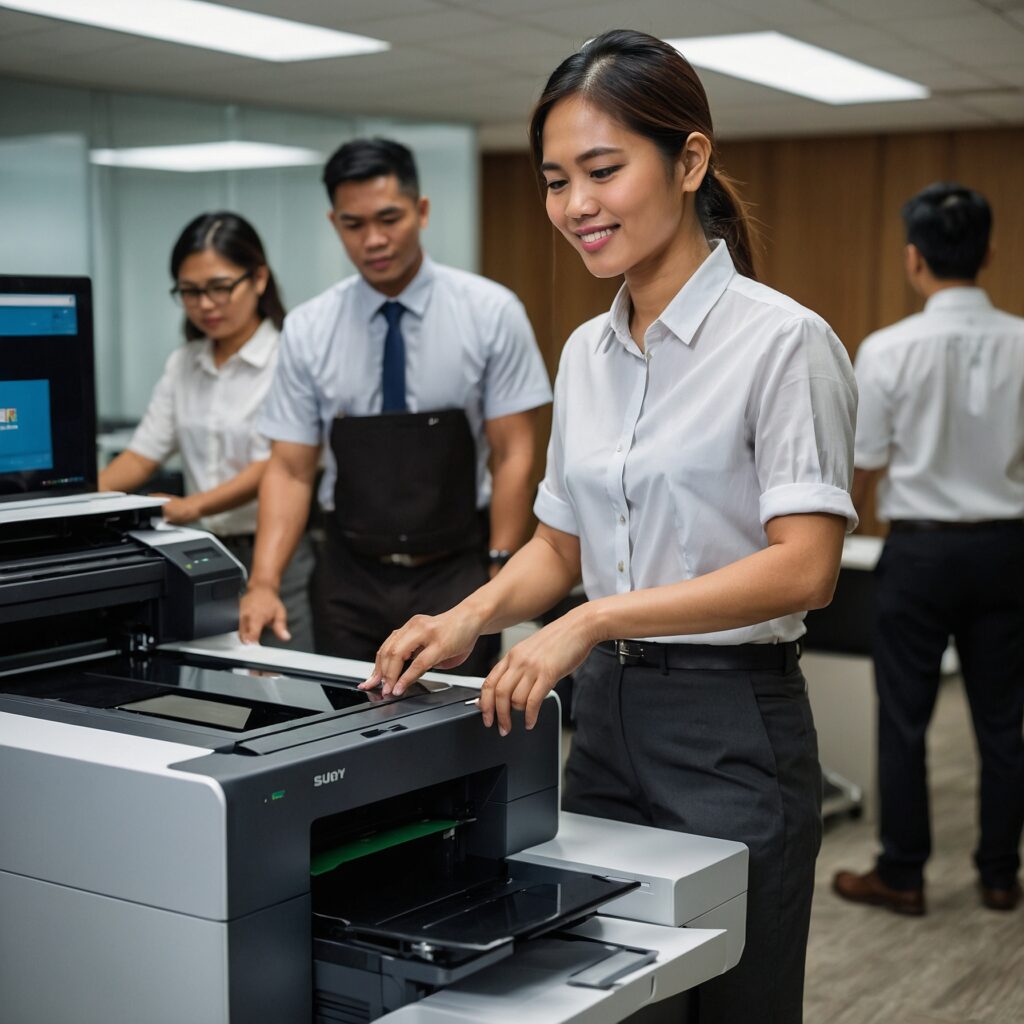Cost Comparison: Renting vs. Buying a Copier

Cost Comparison: Renting vs. Buying a Copier
Part 1: Exploring the financial implications
When businesses face the need for a copier, one of the first decisions is whether to rent or buy. Both options come with distinct financial considerations that can significantly impact budgets and long-term operations. Understanding these differences is key to making an informed choice that aligns with your organization’s goals.
In this section, we’ll explore the costs associated with renting and buying copiers, discuss their pros and cons, and examine the financial implications for different types of businesses.
Initial costs
Renting a copier
Renting offers an affordable entry point for businesses that prefer to avoid large upfront investments. Initial costs typically include:
- First month’s rent: Usually a fraction of the cost of purchasing a copier.
- Delivery and installation fees: These may be included in the rental agreement or charged separately.
Buying a copier
Buying a copier requires a substantial upfront payment, covering the entire cost of the equipment. Additional initial expenses include:
- Taxes and fees: Depending on the copier’s value.
- Setup and installation costs: Not always included in the purchase price.
Long-term costs
Renting a copier
Rental agreements often bundle maintenance, repairs, and consumables into a monthly fee, providing predictable expenses. However, over time, renting may cost more than purchasing due to:
- Monthly rental payments.
- Potential charges for exceeding usage limits.
Buying a copier
While buying eliminates recurring rental fees, it introduces long-term costs for:
- Maintenance and repairs: Typically not covered after the warranty period.
- Consumables: Ink, toner, and paper expenses can add up over time.
- Technology obsolescence: Purchased equipment may become outdated, requiring future upgrades.
Maintenance and support
Renting a copier
Rental agreements usually include comprehensive maintenance and support, covering:
- Routine inspections.
- Repairs and replacement parts.
- Access to a support hotline for troubleshooting.
This ensures minimal downtime and fewer unexpected costs.
Buying a copier
When purchasing, maintenance and support are often limited to the warranty period. Afterward, businesses must:
- Pay for repairs and replacement parts out of pocket.
- Manage service schedules independently, potentially leading to higher costs if issues arise.
Flexibility and scalability
Renting a copier
Renting provides flexibility for businesses with evolving needs. Rental agreements often allow for:
- Equipment upgrades as new technology becomes available.
- Adjustments to the number of devices as the business grows or downsizes.
Buying a copier
Purchasing offers less flexibility. Businesses are tied to their chosen equipment, which can become a liability if:
- Print volume increases beyond the copier’s capacity.
- New technology renders the purchased equipment outdated.
Ideal use cases
Renting a copier
Renting is ideal for:
- Startups and small businesses: With limited budgets and evolving needs.
- Short-term projects: Such as events or seasonal operations.
- Businesses prioritizing flexibility: Those who want the option to upgrade or adjust their equipment.
Buying a copier
Buying is suitable for:
- Established businesses: With stable print volumes and long-term needs.
- High-volume operations: Where the cost of purchasing is offset by savings on rental fees.
- Companies with specific requirements: Where customized solutions are necessary.
FAQ: Renting vs. buying a copier
1. What’s the biggest advantage of renting a copier?
The biggest advantage is flexibility. Renting allows businesses to upgrade equipment and scale operations without the burden of a large upfront cost.
2. How do I know if buying a copier is right for my business?
If your business has a stable print volume and you prefer to own equipment for long-term use, buying may be a better option.
3. Are maintenance costs included in rental agreements?
Yes, most rental agreements include maintenance and support, ensuring predictable expenses and minimal downtime.
4. What happens when purchased equipment becomes outdated?
Outdated equipment must be replaced or upgraded, which can be costly. Renting mitigates this risk by offering access to newer technology.
5. Can I switch from renting to buying later?
Yes, many providers offer buyout options, allowing businesses to purchase rented equipment if they decide ownership is more cost-effective.

Part 2: Diving deeper into the cost-benefit analysis
When comparing renting and buying a copier, the financial implications extend beyond the immediate costs. Factors such as tax benefits, cash flow, and the total cost of ownership over time play a significant role in determining which option is best for your business. This section delves into these considerations and offers insights for making the right choice.
Tax benefits and financial flexibility
Renting a copier
Renting offers advantages when it comes to financial reporting and tax deductions:
- Operating expense: Monthly rental payments can often be deducted as a business expense, reducing taxable income.
- Cash flow management: Renting avoids large upfront payments, preserving cash for other operational needs.
- Predictable budgeting: Fixed monthly payments simplify financial planning and ensure there are no surprise costs.
Buying a copier
Purchasing a copier can provide different financial benefits:
- Capital asset: The copier becomes a depreciable asset, allowing businesses to claim tax deductions over its useful life.
- Equity building: Owning the equipment adds value to the company’s balance sheet.
- Lower long-term costs: For businesses with stable needs, buying can reduce overall expenses over time compared to continuous rental payments.
Total cost of ownership (TCO)
Renting a copier
While renting offers flexibility, the TCO over several years can exceed the cost of purchasing. Businesses must weigh:
- Monthly fees: These can accumulate to more than the purchase price if the rental term is long.
- Consumable costs: Some rental agreements charge for consumables separately, increasing the TCO.
- Upgrade and scalability benefits: Renting minimizes risks of obsolescence and ensures access to updated technology, which can offset higher TCO in some cases.
Buying a copier
The TCO for buying includes not only the purchase price but also ongoing expenses for maintenance and consumables:
- Lower cumulative costs: For businesses with stable usage, buying often costs less over the long term compared to renting.
- Higher upfront investment: The initial cost can strain budgets, especially for startups or small businesses.
- Obsolescence risk: Purchased equipment may need replacement or upgrading, increasing long-term costs if it becomes outdated.
Operational and strategic advantages
Renting a copier
Operational advantages of renting include:
- Quick setup: Providers often handle delivery, installation, and setup, reducing downtime.
- Comprehensive support: Maintenance and technical support are usually included, ensuring consistent performance.
- Risk mitigation: Renting eliminates concerns about resale value or disposal of outdated equipment.
Buying a copier
Buying offers different strategic advantages:
- Control over usage: Businesses have full control over how and when the equipment is used.
- No recurring fees: Once the copier is paid for, there are no ongoing rental payments, which can improve cash flow.
- Customization options: Ownership allows for full customization of the equipment to meet specific operational needs.
Decision-making considerations
Key questions to ask
What is your budget?
Renting is ideal for limited budgets, while buying works better for businesses with available capital.What are your long-term needs?
For short-term or evolving needs, renting provides flexibility. Stable, high-volume needs may justify buying.How important is access to the latest technology?
Renting allows businesses to upgrade regularly, while buying may lead to obsolescence over time.What are your maintenance preferences?
If you prefer not to handle maintenance, renting offers built-in support. Ownership requires managing maintenance independently.
FAQ: Cost-benefit analysis of renting vs. buying
1. Which option is better for startups?
Renting is often better for startups due to lower initial costs and the ability to scale as the business grows.
2. How does TCO differ between renting and buying?
Renting typically has a higher TCO over time, while buying has a lower TCO but requires a larger upfront investment.
3. Are tax benefits better for renting or buying?
Renting provides ongoing deductions as an operating expense, while buying offers depreciation benefits as a capital asset.
4. What happens if my copier needs change during a rental term?
Many rental agreements include scalability provisions, allowing businesses to upgrade or adjust their equipment mid-term.
5. Can I resell a purchased copier?
Yes, purchased copiers can be resold, but the resale value often decreases significantly due to depreciation and technological advancements.
6. Is renting better for seasonal businesses?
Yes, renting provides flexibility for seasonal businesses, allowing them to return or pause rentals during off-peak periods.
7. How do maintenance costs compare?
Renting includes maintenance as part of the agreement, while buying requires businesses to pay for maintenance after the warranty period.
8. Can renting help with cash flow management?
Yes, renting avoids large upfront payments, preserving cash for other operational needs.
9. What should I prioritize if I choose to buy a copier?
Focus on durability, scalability, and features that align with your long-term business needs to maximize the value of your purchase.
10. How do providers handle equipment upgrades for renters?
Rental agreements often allow for upgrades to newer models, ensuring businesses can access the latest technology without buying new equipment.

FAQ: Renting vs. Buying a Copier
1. How does renting help with tax benefits?
Rental payments are typically considered operating expenses, which can be deducted from taxable income. This provides ongoing tax benefits throughout the rental term.
2. Can I switch from renting to owning?
Some providers offer buyout options that allow businesses to purchase the rented copier if they decide ownership is a better fit.
3. How do depreciation benefits work for purchased copiers?
When you buy a copier, it becomes a capital asset. You can claim depreciation over the equipment’s useful life, reducing taxable income.
4. Is renting always more expensive in the long term?
Not always. Renting can save costs on maintenance, upgrades, and technology obsolescence, which may offset higher cumulative rental fees over time.
5. How does TCO vary for high-volume printing needs?
For high-volume users, buying a copier often results in a lower TCO compared to renting, as there are no recurring rental payments. However, maintenance and consumables must be factored in.
6. What flexibility does renting provide for growing businesses?
Renting allows businesses to upgrade equipment or adjust the number of devices as needs change, ensuring scalability without large capital investments.
7. Are there hidden costs in rental agreements?
Potential hidden costs include overuse penalties, charges for consumables, and fees for delivery, installation, or early termination. Reviewing the agreement carefully helps avoid surprises.
8. How can analytics tools reduce printing costs?
Analytics tools track usage patterns, helping businesses identify inefficiencies and implement cost-saving measures like duplex printing or limiting unnecessary color prints.
9. What are the risks of buying a copier?
The primary risks are obsolescence, high upfront costs, and unexpected maintenance expenses after the warranty period ends.
10. Can I upgrade my rented copier during the term?
Yes, many rental agreements include upgrade options, allowing businesses to transition to newer models as technology evolves or needs change.
11. How do consumable costs compare between renting and buying?
Renting agreements may include consumables, simplifying budgeting, while buying requires businesses to purchase toner, ink, and paper separately, which can increase costs over time.
12. Are rented copiers energy-efficient?
Many providers offer energy-efficient models for rent, helping businesses reduce utility bills and align with sustainability goals.
13. Is renting better for seasonal businesses?
Yes, renting is ideal for seasonal operations, as agreements can be paused or adjusted during off-peak periods, minimizing unnecessary costs.
14. How do I calculate the TCO for renting vs. buying?
Include all costs, such as monthly rental fees, maintenance, consumables, and potential upgrade expenses for renting. For buying, factor in the purchase price, maintenance, and consumables over the equipment’s lifespan.
15. What happens if a purchased copier breaks down after the warranty?
After the warranty period, repair and maintenance costs are the responsibility of the owner, which can lead to unexpected expenses.
16. Do rental agreements include support and training?
Many rental agreements include support services and training sessions for staff, especially for advanced or multifunctional copiers.
17. How does technology obsolescence affect buying decisions?
Purchased equipment can become outdated as new technology emerges, requiring businesses to invest in replacements or upgrades, which increases long-term costs.
18. Can I resell a purchased copier?
Yes, but resale values typically decrease significantly due to depreciation and the availability of newer, more advanced models.
19. What’s the advantage of renting for short-term projects?
Renting provides access to high-quality equipment without the commitment of ownership, making it ideal for temporary needs or one-time events.
20. Should I prioritize budget or functionality when deciding?
Prioritize functionality if your business has specific needs or high print volumes. If flexibility and cost management are more critical, renting may be the better option.

Part 3: Making the right decision for your business
Choosing between renting and buying a copier depends on several factors unique to your business. By understanding your organization’s priorities, usage needs, and financial goals, you can determine which option offers the most value. In this final section, we’ll provide actionable guidance to help you make an informed decision, highlight key advantages of each option, and outline steps for evaluating your needs.
Key considerations when choosing between renting and buying
1. Assess your budget
- Renting is ideal for businesses with limited upfront capital or those needing predictable monthly costs.
- Buying suits organizations with the financial flexibility to make a significant initial investment.
2. Evaluate your usage
- High-volume printing often justifies purchasing due to the lower long-term cost of ownership.
- For businesses with varying or low print volumes, renting provides scalability and flexibility.
3. Consider your business’s growth potential
- Renting accommodates evolving needs, such as expanding operations or adopting new technology.
- Buying locks you into specific equipment, which may limit adaptability over time.
4. Weigh the importance of technology upgrades
- Renting ensures access to the latest technology without requiring additional investments.
- Buying may result in outdated equipment unless you budget for future upgrades.
Benefits of renting a copier
- Flexibility: Renting allows you to scale up or down based on business needs.
- Predictable expenses: Monthly rental payments simplify budgeting and cash flow management.
- Included maintenance: Providers typically handle repairs, replacements, and support, reducing operational burdens.
- Access to upgrades: Easily switch to newer models as technology evolves or needs change.
Benefits of buying a copier
- Long-term cost savings: Ownership eliminates recurring rental fees, often reducing total expenses over time.
- Full control: You decide how the equipment is used, maintained, and integrated into your workflows.
- Customizable solutions: Ownership allows for tailored configurations to meet specific business requirements.
- Asset value: Purchased copiers add value to your company’s balance sheet and can be resold when no longer needed.
Steps to evaluate your copier needs
1. Identify your operational requirements
- Assess print volume and frequency.
- Determine the need for advanced features, such as color printing, scanning, or cloud integration.
2. Compare providers
- Request quotes for both rental and purchase options.
- Look for transparent pricing, clear terms, and flexible agreements.
3. Consider long-term costs
- Calculate the total cost of ownership for buying, including maintenance, consumables, and potential upgrades.
- Evaluate the cumulative costs of renting over the anticipated term.
4. Factor in business goals
- If growth and flexibility are priorities, renting may be more suitable.
- If stability and cost savings are key, buying may align better with your goals.
Real-world example: Renting vs. buying
Case study: A mid-sized legal firm
- Challenge: The firm needed reliable, high-capacity copiers for document-heavy workflows but had limited upfront capital.
- Solution: They chose to rent copiers with a comprehensive maintenance plan and scalable terms.
- Result: The firm minimized upfront costs, maintained operational efficiency, and upgraded equipment as their needs evolved.
Case study: A large manufacturing company
- Challenge: The company required multiple high-volume copiers for consistent daily use.
- Solution: They purchased copiers with extended warranties and implemented a proactive maintenance schedule.
- Result: Ownership reduced long-term costs, and in-house control ensured seamless operations.
FAQ: Making the right choice
1. How do I decide between renting and buying a copier?
Evaluate your budget, print volume, and long-term goals. Renting is better for flexibility, while buying suits stable, high-volume needs.
2. What’s the biggest advantage of renting?
Renting provides scalability and access to upgrades, making it ideal for businesses with evolving requirements.
3. Does renting cost more than buying over time?
In many cases, yes. Renting can have a higher total cost over time, but it includes benefits like maintenance, flexibility, and access to newer technology.
4. Can I transition from renting to buying?
Some providers offer buyout options, allowing you to purchase rented equipment if ownership becomes more advantageous.
5. How do maintenance costs differ between renting and buying?
Maintenance is often included in rental agreements, while owners must cover maintenance expenses after the warranty period ends.
6. What’s the lifespan of a purchased copier?
Most copiers last 5-7 years with proper maintenance. However, technological advancements may necessitate earlier upgrades.
7. How do I ensure I’m getting the best deal?
Compare quotes from multiple providers, read the terms carefully, and negotiate for added benefits like bundled services or reduced fees.
8. Are there tax benefits to renting?
Yes, rental payments are usually deductible as operating expenses, providing ongoing tax advantages.
9. How do consumables affect the decision?
Rental agreements may include consumables, simplifying costs, while owners must purchase toner, ink, and paper separately.
10. What’s better for seasonal businesses?
Renting is ideal for seasonal operations, as agreements can often be adjusted or paused during off-peak periods.
Call to action
Make an informed decision for your business with the help of Marga Enterprises. Whether you choose to rent or buy, we offer tailored solutions to meet your unique needs.
Contact us today at 09171642540 or 09614481276, or email us at marga.enterprises2013@gmail.com to explore your options.
Visit Marga Enterprises to discover why we’re the No. 1 Copier & Printer Rental Provider in the Philippines.
Stay updated on the latest copier solutions and expert advice through our Facebook and YouTube pages.
